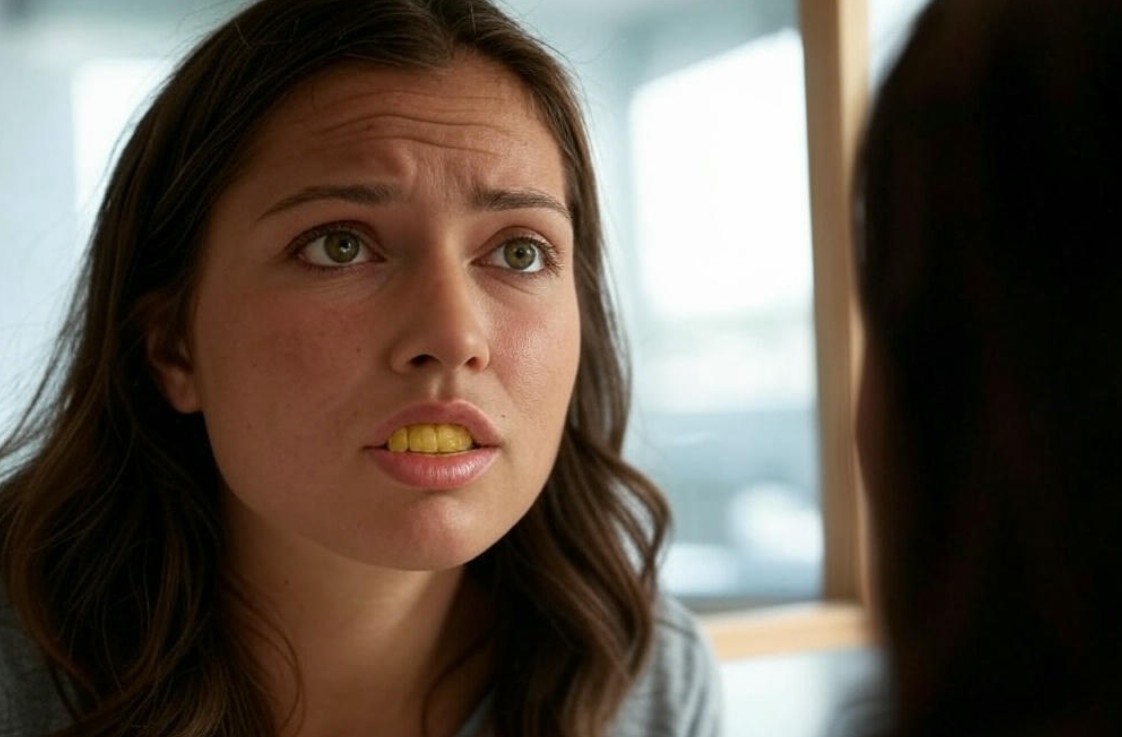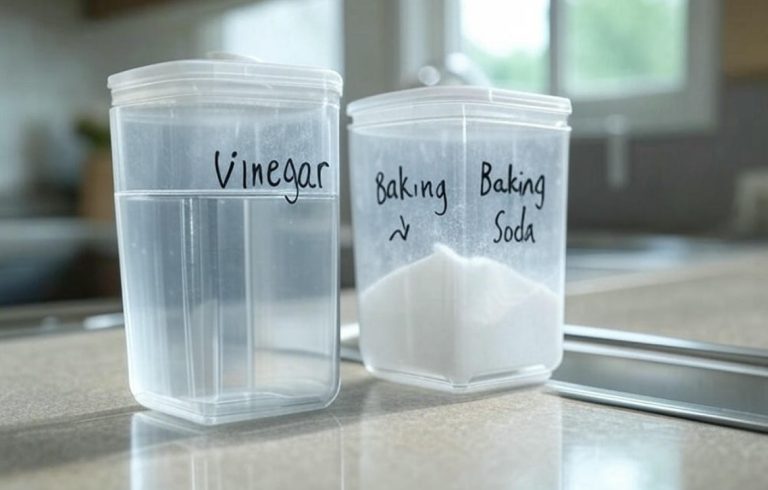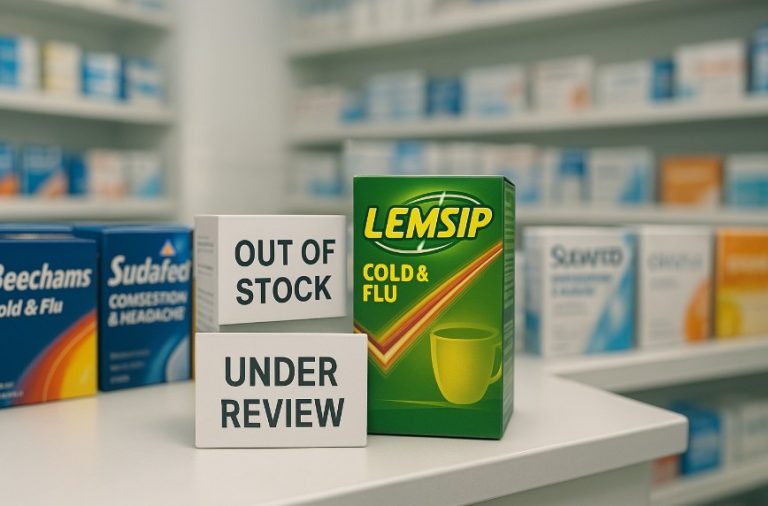Why Are My Teeth Yellow When I Brush Them Everyday?
Brushing your teeth daily is essential for oral hygiene, yet many people still struggle with yellow teeth.
This can be frustrating, especially when you follow a strict dental care routine. If you’re wondering why your teeth remain yellow despite brushing every day, you’re not alone.
The colour of your teeth is influenced by multiple factors beyond just brushing. Enamel thickness, diet, genetics, and lifestyle habits all play a role in tooth discolouration. Some stains are deep within the tooth, making them resistant to brushing.
In this article, we will explore the common reasons for yellow teeth, mistakes you may be making, and how to achieve a whiter smile.
What Are the Common Causes of Yellow Teeth?
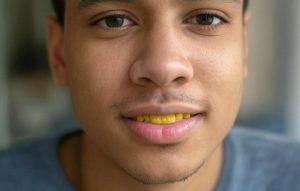
If your teeth remain yellow despite regular brushing, it could be due to intrinsic or extrinsic staining. Understanding the difference between these types of stains can help determine the best approach to whitening your teeth.
Intrinsic vs. Extrinsic Stains
Intrinsic Stains
- These stains are deeply embedded within the enamel and cannot be removed through regular brushing.
- They occur due to factors like aging, excessive fluoride exposure, certain medications, or trauma to the tooth.
- Whitening toothpaste has minimal effect on intrinsic stains, requiring professional treatments like bleaching or veneers.
Extrinsic Stains
- These stains appear on the outer surface of the enamel and are caused by dietary habits, smoking, and poor oral hygiene.
- Coffee, tea, red wine, and dark-colored foods contribute to surface staining.
- Regular brushing, along with professional cleanings, can effectively remove extrinsic stains.
If your yellow teeth result from intrinsic discoloration, you may need advanced whitening treatments rather than relying on daily brushing alone.
Why Are My Teeth Yellow When I Brush Them Everyday?
If you brush your teeth every day yet still notice yellowing, several factors could be at play. Brushing is just one part of oral hygiene, and it may not address all the causes of discoloration. Here are some common reasons why your teeth may appear yellow despite regular brushing:
What are the Natural Factors Contributing to Tooth Color?
- Tooth color varies among individuals and is largely influenced by the dentin, which lies beneath the enamel and ranges from yellowish to grayish hues.
- Genetics determine the thickness and translucency of the enamel, directly impacting the visible color of your teeth.
- Having teeth that aren’t perfectly white doesn’t mean they are unhealthy some people naturally have slightly yellowish teeth.
What are the External Staining Agents?
Impact of Food and Beverages on Tooth Color
- Certain foods and drinks can stain teeth over time due to their high pigment content.
- Coffee, tea, red wine, and dark sodas contain chromogens, which attach to tooth enamel and lead to discoloration.
- Acidic foods like citrus fruits can erode enamel, making it easier for stains to set in.
Tobacco Use and Tooth Discoloration

- Smoking or chewing tobacco is a major contributor to yellow teeth.
- Nicotine and tar in tobacco leave a yellow or brown coloration on teeth with prolonged use.
- Quitting tobacco can improve oral health and prevent further staining.
Inadequate Brushing Techniques
- Brushing incorrectly can leave plaque and food particles behind, leading to discoloration.
- Using a hard-bristled toothbrush or brushing too aggressively can wear down enamel, making teeth look more yellow.
- A soft-bristled toothbrush and gentle circular motions are recommended for effective cleaning.
Plaque and Tartar Buildup
- Plaque, a bacterial film mixed with food particles, can harden into tartar if not removed regularly.
- Tartar buildup, especially near the gumline, can contribute to yellowing.
- Professional dental cleanings are essential to remove tartar and maintain the natural color of your teeth.
Medications and Tooth Discoloration
- Certain medications, like tetracycline antibiotics, can cause permanent tooth discoloration if taken during childhood.
- Other medications, such as antihistamines, antipsychotics, and blood pressure drugs, may also cause discoloration as a side effect.
Aging and Tooth Color Changes
- As you age, the outer layer of enamel naturally wears down, revealing the yellowish dentin underneath.
- A lifetime of exposure to staining foods, drinks, and natural wear contributes to gradual tooth yellowing.
- Brushing alone cannot reverse discoloration caused by aging.
Fluorosis and Water Source Effects
- Excessive fluoride exposure during childhood can cause fluorosis, leading to discoloration.
- High fluoride levels in drinking water may result in white or brown stains on teeth.
- Hard water with high mineral content may also leave deposits on teeth, affecting their appearance.
Medical Conditions and Dental Issues
- Certain health conditions and treatments, such as chemotherapy or radiation to the head and neck, can affect tooth color.
- Tooth decay and some dental fillings can lead to discoloration.
- Trauma to a tooth, such as a fall or injury, can cause it to darken over time.
Bruxism (Teeth Grinding) and Enamel Erosion
- Grinding your teeth (bruxism) can wear down the enamel, exposing the yellowish dentin beneath.
- Acidic foods, drinks, and acid reflux can also erode enamel, making teeth appear more yellow.
Does Brushing Alone Whiten Teeth?
- Brushing helps remove surface stains but does not change the natural shade of your teeth.
- Deep intrinsic stains require whitening treatments, such as professional cleanings, bleaching, or veneers.
- Using a whitening toothpaste may help reduce surface stains but should be used cautiously to avoid enamel damage.
If your teeth remain yellow despite daily brushing, consider evaluating your diet, lifestyle, and oral hygiene routine.
Proper brushing techniques, avoiding staining foods and tobacco, and regular professional cleanings can help maintain a brighter smile.
If discoloration persists, consulting a dentist for whitening options or checking for underlying dental issues is recommended
Could My Toothpaste or Mouthwash Be Making My Teeth Yellow?
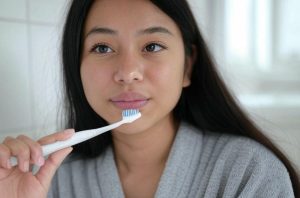
Not all oral care products are designed to whiten teeth, and some may even contribute to discolouration over time.
The ingredients in your toothpaste or mouthwash can have a significant impact on the colour of your teeth.
Toothpaste Factors That May Cause Yellowing
- Fluoride toothpaste strengthens enamel and prevents cavities but does not actively remove stains.
- Abrasive toothpaste can wear down enamel, exposing the yellow dentin underneath, making teeth appear more discoloured.
- Whitening toothpaste works mainly on surface stains but may not effectively remove deeper intrinsic discolouration.
Mouthwash and Teeth Yellowing
- Mouthwashes containing chlorhexidine or cetylpyridinium chloride may cause staining with long-term use.
- Alcohol-based mouthwashes dry out the mouth, reducing saliva production and leading to plaque buildup, which contributes to yellowing.
To maintain a bright smile, choose a gentle fluoride-based toothpaste and a non-alcoholic mouthwash to protect enamel while preventing stains.
What Medical Conditions and Medications Cause Yellow Teeth?
Certain health conditions and medications can contribute to teeth yellowing by affecting enamel strength, saliva production, and overall tooth structure.
Medical Conditions That Affect Tooth Colour
- Liver disease can cause a buildup of bile pigments in the body, leading to yellowish discolouration in the teeth.
- Enamel hypoplasia is a condition where enamel does not develop properly, resulting in thin enamel and more visible yellow dentin.
- Acid reflux (GERD) allows stomach acid to reach the mouth, eroding enamel and exposing the yellowish dentin beneath.
Medications That Stain Teeth
- Antibiotics like tetracycline and doxycycline cause deep, intrinsic staining, particularly when taken during childhood.
- Antihistamines and blood pressure medications reduce saliva production, leading to plaque buildup and increased staining.
- Chemotherapy and radiation therapy weaken enamel, sometimes causing permanent yellowing or darkening of teeth.
If you suspect your medication or a health condition is affecting your tooth colour, consult your dentist for whitening treatments or preventive solutions.
How Do Foods and Drinks Contribute to Teeth Discolouration?
Many foods and beverages contain pigments, acids, or tannins that stain teeth over time. Understanding which ones contribute to yellowing can help you take preventive measures.
Beverages That Stain Teeth

- Coffee, tea, and red wine contain tannins, which bind to enamel and cause yellow or brown stains over time.
- Sodas and fruit juices are highly acidic, weakening enamel and making teeth more susceptible to staining.
Foods That Cause Yellowing
- Soy sauce, curry, and tomato-based sauces are rich in dark pigments that cling to teeth, leaving deep stains.
- Berries (blueberries, blackberries, raspberries) contain natural dyes that can stain enamel, especially when consumed frequently.
To prevent staining, drink water after consuming pigmented foods, use a straw for beverages, and maintain good oral hygiene to minimise discolouration.
Can Genetics Influence My Tooth Colour?
Yes, genetics play a significant role in determining the natural colour of your teeth. Some people inherit thicker enamel, which makes their teeth appear naturally whiter.
Others may have thinner enamel, exposing the yellowish dentin underneath, which affects the overall shade of their teeth.
If your parents have naturally white teeth, you are more likely to inherit the same trait. On the other hand, if your family has a history of slightly yellow or discoloured teeth, genetics may be the reason behind your tooth shade.
In some cases, genetic conditions like dentinogenesis imperfecta and amelogenesis imperfecta can lead to severe tooth discolouration. These conditions affect the development of enamel and dentin, resulting in teeth that appear discoloured or weak.
While genetics influence tooth colour, good oral hygiene and professional whitening treatments can help improve their appearance.
Can You Overcome Genetic Discolouration?
While you cannot alter your genetic makeup, professional whitening treatments can improve tooth brightness.
Laser whitening, custom bleaching trays, and veneers are common solutions for those struggling with genetic tooth discolouration.
Consulting a dentist will help determine the best whitening approach based on your enamel thickness and tooth structure.
How to Fix Yellow Teeth?
If your teeth are yellow despite regular brushing, multiple whitening methods can help restore their brightness. Some stains are removable with at-home treatments, while others require professional procedures.
At-Home Remedies
- Whitening toothpaste: Contains mild abrasives that gradually remove surface stains.
- Hydrogen peroxide & baking soda: A natural combination that helps lift mild discolouration.
- Oil pulling with coconut oil: May reduce plaque and prevent further staining.
Professional Treatments
- In-office whitening: Uses strong bleaching agents for quick and noticeable results.
- Dental bonding: Covers deep stains with tooth-coloured resin.
- Veneers: A long-term solution for severe discolouration, covering the front of the teeth.
Making dietary changes, improving oral hygiene, and using the right products can also prevent further yellowing. Consulting a dentist will help determine the best approach for long-lasting whitening results.
When Should I Consider Professional Teeth Whitening?

If at-home whitening methods are not producing the desired results, it may be time to consider professional teeth whitening treatments.
Deep stains, medication-induced discolouration, or enamel erosion may require stronger bleaching solutions.
Signs You Need Professional Whitening
- Persistent yellow stains that do not improve with regular brushing.
- Staining from medications like tetracycline or long-term fluoride exposure.
- Naturally yellow or greyish teeth due to genetics.
- Enamel erosion, which makes natural whitening difficult.
Best Professional Whitening Options
- Laser whitening: Provides instant results by breaking down deep stains.
- Custom-fitted whitening trays: Offer an even whitening effect with controlled bleaching agents.
- Veneers: Ideal for severe discolouration, offering a permanent, bright smile.
Before undergoing professional whitening, it is essential to consult a dentist to ensure you choose the safest and most effective treatment based on your tooth condition.
How Can I Prevent My Teeth from Becoming More Yellow?
Preventing teeth from yellowing involves a combination of good oral hygiene, dietary adjustments, and professional care. By maintaining proper habits, you can keep your teeth whiter for longer.
Daily Habits for a Brighter Smile
- Brush twice a day with fluoride toothpaste to remove surface stains.
- Floss daily to eliminate plaque buildup between teeth.
- Use a soft-bristled toothbrush to avoid enamel erosion.
Dietary Changes to Prevent Staining
- Avoid excessive coffee, tea, red wine, and coloured sodas, which stain enamel.
- Reduce acidic foods (like citrus and vinegar) to protect enamel.
- Drink plenty of water to rinse away stain-causing particles.
Regular Dental Visits
- Professional cleanings remove stubborn plaque and tartar.
- Your dentist can recommend whitening treatments if needed.
- Dental check-ups help identify and prevent early enamel damage.
By following these steps, you can effectively maintain white teeth and prevent yellowing over time.
Conclusion
Yellow teeth can be frustrating, especially when you brush daily. However, brushing alone is not always enough to combat discolouration. Genetics, diet, enamel erosion, plaque buildup, and lifestyle choices all contribute to yellowing.
Understanding the causes of yellow teeth is the first step toward achieving a brighter smile.
While home remedies such as whitening toothpaste and hydrogen peroxide can help, professional treatments like laser whitening or veneers may be necessary for long-lasting results.
To prevent further discolouration, maintain good oral hygiene, limit stain-causing foods, and visit your dentist regularly. Small adjustments in your daily routine can make a significant difference in keeping your teeth naturally white.
If discolouration persists, consult a dental professional for tailored whitening solutions. A healthy, bright smile is always within reach with the right care and treatment.
Frequently Asked Questions (FAQs)
Why are my teeth yellow all of a sudden?
Sudden yellowing may be due to diet changes, medication side effects, or plaque buildup. A professional cleaning can help identify and treat the cause.
Why are my teeth yellow near the gums?
Plaque and tartar tend to accumulate near the gumline, leading to yellowing. Regular flossing and professional cleanings can help prevent this buildup.
How long does it take for teeth whitening to show results?
Over-the-counter whitening products may take weeks, while professional treatments can show results in one session. The effectiveness depends on the type of stains.
Why do some people never get yellow teeth despite drinking coffee?
Genetics, saliva composition, and stronger enamel help some people resist staining. Maintaining good oral hygiene also plays a crucial role in preventing discolouration.
Does stress or medication affect tooth colour?
Yes, stress can lead to teeth grinding and enamel wear, making teeth appear yellow. Certain medications, like antibiotics and antihistamines, may also cause staining.
Why are my teeth yellow when I brush them every day with braces?
Braces create areas where plaque accumulates, leading to discolouration. Proper brushing, flossing, and professional cleanings can help prevent yellowing.
Can your teeth go from yellow to white by brushing?
Brushing removes surface stains but cannot change deep discolouration. Whitening treatments and professional cleaning are required for long-lasting results.

